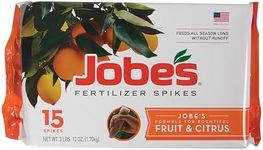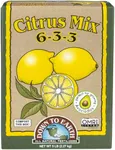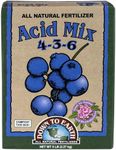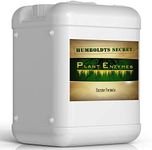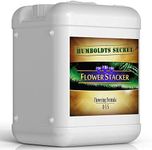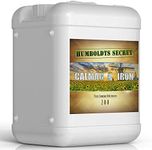Buying Guide for the Best Fruit Tree Fertilizers
Choosing the right fertilizer for your fruit trees is essential for ensuring healthy growth and a bountiful harvest. Fertilizers provide the necessary nutrients that fruit trees need to thrive, but not all fertilizers are created equal. Understanding the key specifications and how they relate to your specific needs will help you make an informed decision. Here are the key specs to consider when selecting a fruit tree fertilizer.N-P-K RatioThe N-P-K ratio represents the percentage of nitrogen (N), phosphorus (P), and potassium (K) in the fertilizer. Nitrogen promotes leafy growth, phosphorus supports root and flower development, and potassium enhances overall plant health. For fruit trees, a balanced ratio like 10-10-10 or one slightly higher in phosphorus, such as 5-10-5, is often recommended. If your trees are young and need more leafy growth, a higher nitrogen ratio might be beneficial. For mature trees focusing on fruit production, a higher phosphorus content can be more advantageous.
Type of FertilizerFertilizers come in various forms, including granular, liquid, and spikes. Granular fertilizers are easy to apply and provide a slow release of nutrients over time. Liquid fertilizers offer quick absorption and are ideal for immediate nutrient needs. Fertilizer spikes are convenient and provide a steady release of nutrients directly to the root zone. Choose granular if you prefer a low-maintenance option, liquid for quick results, and spikes for targeted feeding.
Organic vs. SyntheticOrganic fertilizers are made from natural materials and improve soil health over time, while synthetic fertilizers are chemically formulated for immediate nutrient availability. Organic options, such as compost or manure, are great for long-term soil health and sustainability. Synthetic fertilizers can provide a quick nutrient boost but may not improve soil structure. If you prioritize eco-friendliness and soil health, go for organic. If you need rapid results, synthetic might be the way to go.
MicronutrientsIn addition to the primary nutrients (N-P-K), fruit trees also need micronutrients like iron, zinc, and manganese for optimal growth. Some fertilizers include these micronutrients, which can be beneficial if your soil is deficient. Check the product label for a list of included micronutrients. If your soil tests indicate a deficiency in specific micronutrients, choose a fertilizer that addresses those needs.
Application FrequencyDifferent fertilizers have varying application frequencies, ranging from once a year to every few weeks. Slow-release fertilizers typically require less frequent application, while liquid fertilizers may need to be applied more often. Consider your schedule and how much time you can dedicate to fertilizing your trees. If you prefer less frequent maintenance, opt for a slow-release fertilizer. If you can commit to regular feeding, a liquid fertilizer might be suitable.
Soil pH CompatibilityThe pH level of your soil can affect nutrient availability to your fruit trees. Some fertilizers are formulated to work best within specific pH ranges. Test your soil's pH before selecting a fertilizer and choose one that matches your soil's pH level. If your soil is too acidic or alkaline, you may need to adjust the pH before applying the fertilizer to ensure optimal nutrient uptake.

